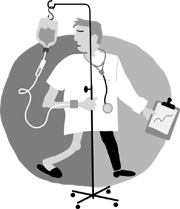
| ||
 | ||
 ILLUSTRATION: TZIGANE |
On the other side of the stethoscope
|
SYLVAIN-JACQUES DESJARDINS | Given his experience, you might think that Dr. John McCans would know the health care system inside out.
But until that fateful day when he fell off his roof while clearing away ice, McCans wasn't able to really see the experience of hospital care through the eyes of a patient. Along with three other doctors, McCans recently spoke about how spending some time in a patient's hospital gown changed the way he practices medicine. The panel discussion, "Physicians as Patients: Lessons for Practice," was part of the Jewish General Hospital's third annual Humanization Of Care Awareness Program. The head of McGill's cardiology program, McCans was admitted to hospital last year after breaking 11 ribs and fracturing his spine. He said being a patient was no picnic. "But as physicians we don't get treated the same as the regular public," he added, noting that injured or ill doctors rarely wait, are rushed through emergency rooms and given tests the general public sometimes wait months to receive. That patients linger helplessly long before being examined in hospital, a crisis afflicting most Montreal emergency rooms, was made painfully obvious to McCans as he was being wheeled out of the ER. He overheard a woman, at her wit's end, asking when her mother would be examined -- they had been waiting since noon and it was past 11 p.m. "You have to be damn sick before being looked at in a hospital," he said. McCans said his experience taught him that doctors can't take for granted that their patients know what is going on. "As physicians, we can't assume facts told once are understood," he said. "We can never forget that patients need reassurance since they don't usually enter hospitals willingly or in a relaxed fashion." For family medicine professor, Dr. Jerome Stasiak, being a patient reminded him of "the fragility of life." After suffering an irregular heart beat, Stasiak immediately consulted a colleague who saw nothing wrong and fed him the standard line, "Get some rest and call me if the condition worsens." Instead, Stasiak decided to start his shift: "I figured I'd already be in the hospital if something happened." Indeed, he ended up lying on a stretcher next to a patient he had treated moments before. After receiving medication, Stasiak was admitted to a secluded section of the hospital. He recalls a feeling of helplessness. "Lying in a hospital bed was an interesting experience in loneliness," he said, adding he found it difficult to control his fear and "reassurance from an authority" was the only way to relax him. Stasiak emphasized that a simple greeting can make a huge difference to a patient. "I found hospital staff tended to avoid saying 'hello,'" he recalled. Two years after his experience, he is now more upbeat with patients and visits them as often as possible. "Our (doctors') visits to patients are extremely important," he said, since the human contact helps put them at ease. Also, he now tends to give his patients the best prognosis possible. "I've found that trivializing (a condition) to a layperson reassures them." Dr. Rubin Becker, the director of McGill's residency program at the Jewish General, said becoming a patient after a serious fracture gave him a sense of doom. The pain and discomfort of his condition was only one factor. He also remembers being cut off from the outside world, with no phone, and losing all privacy. "I felt trapped lying in bed," he said, noting human contact became paramount. "I soon recognized the exceeding importance of a warm smile, a touch or a visit (from health professionals)." For family medicine professor Dr. Lisa Graves, becoming a patient when she delivered twin boys by caesarean section was made more unpleasant considering she had performed the operation on others. "I found it extremely disconcerting to have a procedure performed on me when I knew exactly what was being done," she said. Graves also remembers that sharing a room with a vomiting, insomniac patient was a harrowing experience. Her children were kept on different floors of the hospital, complicating her desire to breastfeed. "Checking out early was truly cathartic," she said, noting she was glad hospitals have ombudsmen to address problems. "I felt empowered as a patient that I was able to articulate my views and be an agent of change," she said, adding she is now a "patient advocate" and encourages her own patients to voice their concerns.
|
|
| |||||